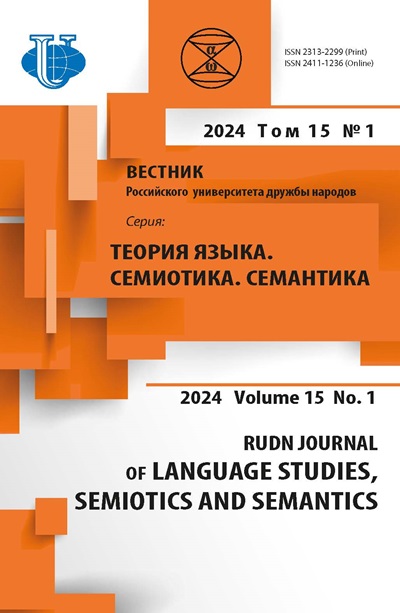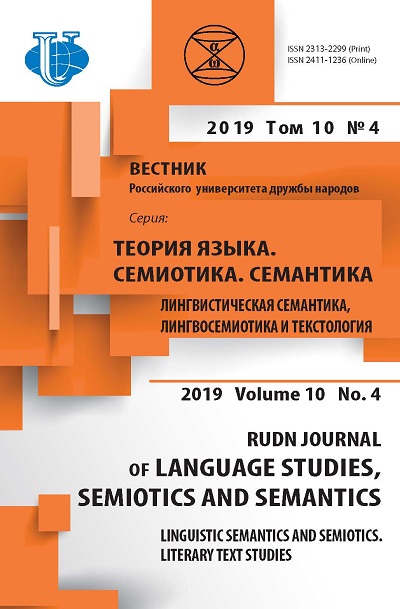Zones and Taxis: Locative Semantics of Russian Cases in Terms of Modern Systems Linguistics
- Authors: Dremov A.F.1
-
Affiliations:
- MGIMO-University
- Issue: Vol 10, No 4 (2019): Linguistic Semantics and Semiotics. Literary Text Studies
- Pages: 789-809
- Section: FUNCTIONAL SEMANTICS
- URL: https://journals.rudn.ru/semiotics-semantics/article/view/22768
- DOI: https://doi.org/10.22363/2313-2299-2019-10-4-789-809
Cite item
Full Text
Abstract
This paper presents the results of the analysis of locative case semantics from the standpoint of modern system linguistics, in which case is interpreted as a formal grammatical category of a name that arose in Russian as a typical representative of inflecting languages in response to a functional query of the language system to provide compression and a formal content expression (predicative, logical) connectivity of the antiderivative text necessary for an exhaustive description of the event. Zones (or spheres) of an object are objectively existing structural elements of a person and a thing, the presence of which is especially pronounced when these persons or things become participants in an event, which in system linguistics is understood as a combination of genetically related phenomena that form a causal cycle. In a simple sentence, the main means of expressing taxis, interpreted as a chronology of the phenomena of subjects and objects participating in an event, are cases.
About the authors
Alexey F. Dremov
MGIMO-University
Author for correspondence.
Email: afdream@bk.ru
PhD of Philology, Associate Professor, Associate Professor of the Russian Department
76, Prospect Vernadskogo, Moscow, Russian Federation, 119454References
- Melnikov, G.P. (1980). The nature of case values and the classification of cases In Studies in the field of grammar and typology of languages. Moscow: Publishing House of Moscow State University. pp. 39—64 (electronic version). (In Russ.).
- Melnikov, G.P. (2003). System typology of languages: Principles, Methods, Models, L.G. Zubkova (Ed.). Moscow: Nauka. (In Russ.).
- Hjelmslev, L. (1935—1937). La catégorie des cas In Etude de grammaire générale. Aarhus: Universitetsforlaget. (In French).
- Jacobson, R.O. (1985). To the general theory of the case. The general meaning of the Russian case. Selected works. Moscow: Progress. pp. 133—175. (In Russ.).
- Vsevolodova, M.V. & Vladimirsky, E.V. (1982). Ways of expressing spatial relations in modern Russian. Moscow: Russkij jazyk. (In Russ.).
- Melnikov, G.P. & Dremov, A.F. (1984). Levels of text connectivity, current prediction and case from the standpoint of systemic linguistics. Communicative Syntax, O.A. Krylova (Ed.). Moscow: Universitet druzhby narodov. pp. 49—70. (In Russ.).
- FE—Philosophical Encyclopedia (1960—1970). In 5 vols. F.V. Konstantinov (Ed.). Vol. 4. Moscow: Bol'shaja sovetskaja jenciklopedija. (In Russ.).
- Krysin, L.P. (2006). Dictionary of foreign words. Moscow: BECM. (In Russ.).
- Dremov, A.F. (2001). The system theory of case and preposition in the practice of teaching Russian as a foreign language. Moscow: Mir russkogo slova, 2001. no 1—4. (In Russ.).
- Jacobson, R.O. (1972). Shifters, verb categories and Russian verb In Principles of typological analysis of languages of different systems. Moscow: Nauka. pp. 95—113. (In Russ.).
- Bondarko, A.V. (1990). Taxis In Linguistic Encyclopedic Dictionary. Moscow: sovetskaja jenciklopedija. pp. 503—504. (In Russ.).
- Sechehaye, A. (1926). Essai sur la structure logique de la phrase. Paris: Champion. (In French).
- Tenier, L. (1988). Fundamentals of structural syntax, G.V. Stepanov (Transl.), V.G. Gak (Ed.). Moscow: Progress. (In Russ.).
- Melnikov, G.P. (2000). Systemic typology of languages: synthesis of morphological classification of languages with stadial. Moscow: Publishing House of RUDN. (In Russ.).
- Dremov, A.F. (2004). A model of the internal and external forms of the Russian canonical message In Linguistic being of a person and ethnos: psycholinguistic and cognitive aspects. Issue 7, Pishchalnikova (Ed.). Moscow: Publishing House of Moscow Institute of Physics and Technology. pp. 71—75. (In Russ.).
- Peshkovsky, A.M. (1956). Russian syntax in scientific coverage. Moscow: Uchpedgiz, 1956. (In Russ.).
- Stepanov, Yu.S. (1989). Indo-European proposal. Moscow: Nauka. (In Russ.).
- Fromm, E. (1990). To have or to be? V.I. Dobrenkov (Transl., ed.). Moscow: Progress. (In Russ.).
- Melnikov, G.P. (1978). Systemology and linguistic aspects of cybernetics. Moscow: Sov. radio. (In Russ.).
- Dremov, A.F. (1992). Linguistic model as the basis for a comparative description of languages. In Questions of language contacts and comparative study of languages, G.S. Romanova & G.G. Tyapko (eds.). Moscow: Publishing House of MGIMO. pp. 43—50. (In Russ.).
- Ghazaryan, V.P. Future. URL: http://www.chronos.msu.ru/TERMS/kazaryan_buduscheye.htm (accessed: 08/12/2018). (In Russ.).
- Dremov, A.F. (2019). The Concepts of the Simplest and Simple Sentences in the Paradigm of Systemic Theory of Case. RUDN Journal of Language Studies, Semiotics and Semantics, 10(1) 1, 43—62. (In Russ.).
- Aksakov, K.S. (1855). About Russian verbs. Moscow: L. Stepanov's Publishing House. (In Russ.).













